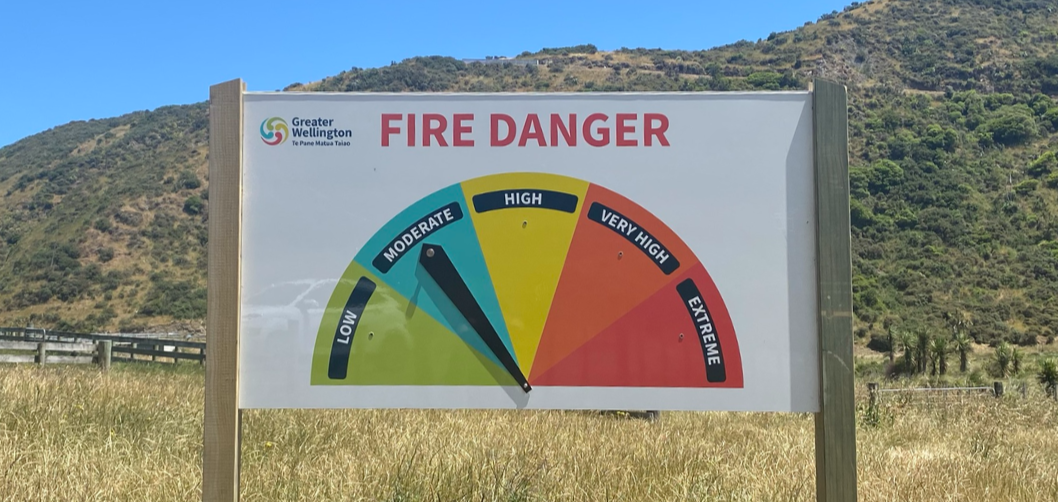 FIRE WARNING at the following parks:
FIRE WARNING at the following parks:
There are currently no fire restrictions in place across our regional parks.
Wildfire season – What you need to know
During summer, Greater Wellington monitors fire danger in our regional parks.
We have implemented fire risk levels to ensure the safety and well-being of our park users.
Each level may trigger restrictions within our parks, such as changes to access or activities allowed. Check the current fire risk level and restrictions on this website before visiting regional parks.
Like Fire and Emergency New Zealand, we use a colour coded fire risk system ranging from green (low risk) to red (extreme risk).
Tips for staying safe
- Always keep a cell phone on you and call 111 in the event of a fire.
- Check what activities are permitted or not permitted within a park.
- During periods of very hot and dry conditions visit parks during the morning before the hottest part of the day.
- Know where you are in the park at all times and know the exit routes.
- You can’t outrun a grass fire. If it’s windy, consider visiting on a calmer day.
- If there is a fire, move away and leave the park by the safest exit.
- Refrain from smoking or vaping in our regional parks, however if you need to, please ensure you fully extinguish butts and take them with you.
Wildfire season – Frequently asked questions
What is the fire risk level system in regional parks?
Greater Wellington uses a colour-coded fire risk system ranging from green (low risk) to red (extreme risk). Each level has specific restrictions on park access and activities to reduce wildfire risks. Check park updates online or at park entrances to know the current risk level.
Why are there fire restrictions this summer?
As climate change intensifies, our parks face increased wildfire threats, especially in areas where former grazing lands are being restored with native plants that haven't yet fully established.
How will I know if there’s a fire restriction in place?
Fire restriction updates are posted on this website under each park’s page, and signs are displayed at park entrances. It’s essential to check these updates before visiting, especially in summer. We’ll also update our social media pages when fire risk increases.
How do you determine fire risk and decide to increase codes?
We use a combination of NIWA’s Fire Weather Indices, weather forecasting and ground condition assessments determine the fire risk in our parks. The assessments consider factors like temperature, humidity, grass curing levels (dryness), and recent and projected rainfall to evaluate how easily a fire could ignite and spread. When these indicators reach trigger points, we look at the projected future weather conditions, raise the fire risk level and update restrictions accordingly.
Why is the park still closed? It’s autumn, and we’ve had lots of rain.
Even after rain, fire risk doesn’t disappear overnight. Dry grass and vegetation need time to break down, and new green growth must establish to reduce fuel levels. This process can take 3–6 weeks, depending on conditions. Until then, the fire risk can remain too high to safely reopen a closed park. Additionally, wind and sun can quickly dry out grass areas after rain.
Why can contractors, utility companies, or park staff access parks when they’re closed to the public?
Certain authorised groups, like contractors and staff, follow stringent safety protocols, including carrying firefighting equipment and following a controlled access plan. This means that Greater Wellington knows their locations within the park, which ensures safer evacuations if needed.
Our fire activity controls are shared with both utility companies and landowners accessing properties across park land for them to adhere to.
By contrast, when members of the public are in the park, we have no way of knowing where they all are and emergency communication is impossible, making evacuation much more difficult in the event of a fire. This is why recreation activities and access is restricted during high fire risk periods—ensuring the safety of everyone.
Are fires allowed in regional parks?
Open fires, including backcountry campfires and beach bonfires, are not allowed during wildfire season. Be cautious with camping stoves and gas barbecues and use them only where permitted. Some of our parks allow campfires in campgrounds. Check the relevant park page for restrictions.
Are there restrictions for vehicles, motorbikes and e-bikes?
Yes. First check the park you are visiting does not have restrictions in place for vehicle access. If vehicles are allowed, avoid parking on dry grass or scrub. Motorbikes must have an exhaust spark arrestor and a fire extinguisher, and 4x4s are required to carry firefighting gear. Keep electric bikes maintained to manufacturer requirements and don’t operate when damaged. Don’t operate e-bikes with home built electrical systems.
Can I still hunt in regional parks during fire season?
Yes, but please shoot only in areas free of dry vegetation and avoid hunting on hot, windy days. Use lead-core bullets when possible as steel-core and copper ammunition are more likely to ignite vegetation. Tracer or incendiary rounds are not allowed.
Can I bring fireworks to celebrate in the parks?
No. Fireworks are prohibited year-round in regional parks due to their high fire risk.
Where can I find more information?
If you’re not sure if an activity or access is restricted in regional parks during fire season, check relevant park pages on this website, look out for signage at park entrances, or contact Greater Wellington on 0800 496 734 or info@gw.govt.nz if you have any questions.
Get in touch
- Phone:
- 0800 496 734
- Email:
- info@gw.govt.nz
